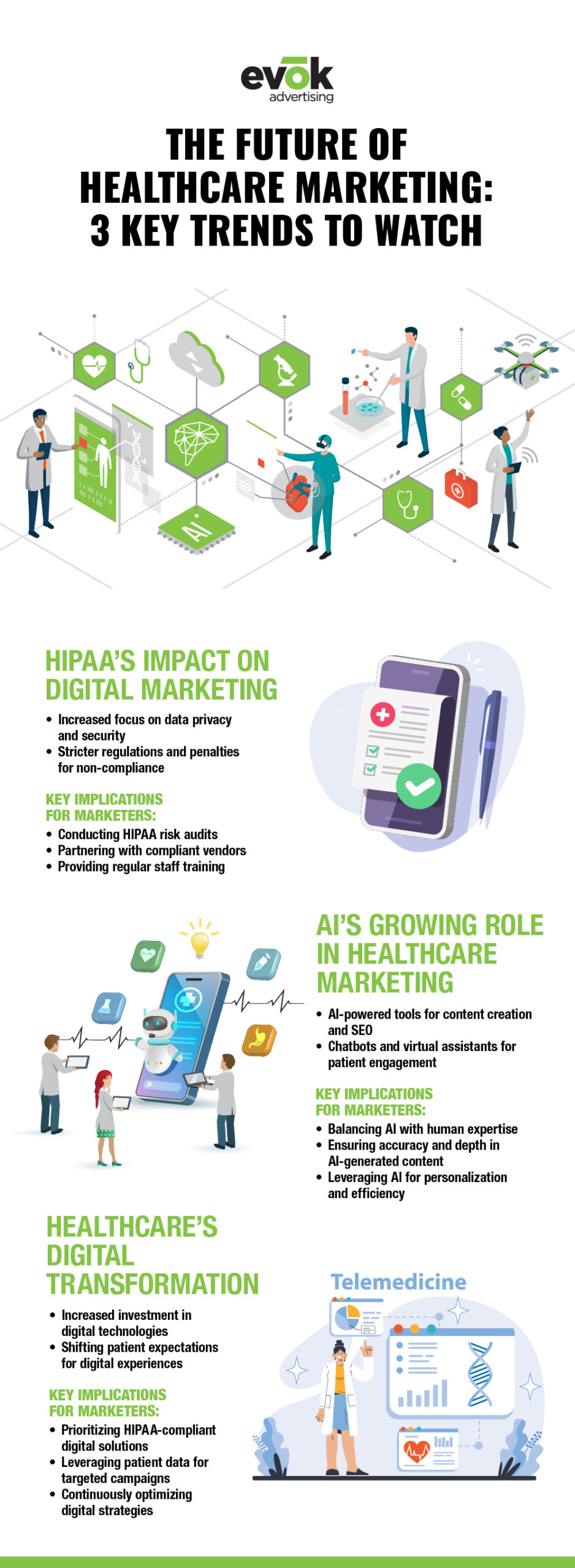
Healthcare Marketing Trends 2024: Embracing Technology & Personalization
The healthcare marketing landscape is evolving at an unprecedented pace, driven by a perfect storm of regulatory changes, technological advancements, and shifting patient expectations. As we move further into 2024, healthcare marketers face a complex and dynamic environment that demands agility, innovation, and a deep understanding of the forces shaping the industry.

In this rapidly changing landscape, three key trends have emerged as critical drivers of success: the impact of HIPAA on digital marketing strategies, the growing role of artificial intelligence (AI) in healthcare marketing, and the ongoing digital transformation of the healthcare industry itself. Each of these trends presents both challenges and opportunities for healthcare marketers, requiring a delicate balance between compliance, innovation, and patient-centricity.
In this blog post, we’ll take a deep dive into each of these three trends, exploring their implications for healthcare marketers and providing actionable insights and strategies for navigating this new era. From the evolving regulatory landscape and the rise of AI-powered marketing solutions to the digital technologies transforming the patient experience, we’ll cover it all.
HIPAA’s Impact on Digital Marketing

In recent years, the healthcare marketing landscape has undergone significant changes due to evolving HIPAA regulations. The Health Insurance Portability and Accountability Act (HIPAA) sets strict standards for protecting patient privacy and securing sensitive health information. As a result, healthcare marketers must navigate these guidelines carefully to avoid potential violations and penalties.
The regulatory landscape began to shift in September 2021 when the Federal Trade Commission (FTC) issued a policy statement requiring all health apps and connected devices to comply with the Health Breach Notification Rule (HBNR). This move signaled a growing concern over the potential disclosure of electronic Protected Health Information (ePHI) as data flows between HIPAA-regulated entities and technology tracking vendors.
The consequences of non-compliance became evident in early 2023 when the FTC imposed fines on companies like GoodRx and BetterHelp for various HBNR violations. These actions sent a clear message to the healthcare industry: no one is exempt from HIPAA regulations, regardless of their size or market position.
In the summer of 2023, the Department of Health and Human Services (HHS) and the FTC further emphasized the importance of HIPAA compliance by issuing a joint letter to 130 hospitals and health systems. The letter highlighted the risks associated with tracking technologies, such as Google Analytics, and their potential to compromise personal health information. By the end of the year, the HHS released a bulletin clarifying the definition of healthcare information and the rules governing its sharing.
The bulletin stated, “Regulated entities are not permitted to use tracking technologies in a manner that would result in impermissible disclosures of PHI to tracking technology vendors or any other violations of the HIPAA Rules.”
These developments have forced healthcare marketers to reevaluate their advertising strategies and scrutinize their methodologies. To avoid costly fines and reputational damage, marketers must ensure that their practices align with HIPAA guidelines and prioritize patient privacy.
Some key implications and insights for healthcare marketers include:
- Conducting thorough audits of marketing tools and technologies to identify potential HIPAA risks
- Partnering with HIPAA-compliant vendors and service providers
- Investing in secure data management systems and protocols
- Providing regular HIPAA training for marketing staff and stakeholders
- Developing clear policies and procedures for handling patient information in marketing campaigns
- Staying informed about the latest HIPAA regulations and industry best practices
AI’s Impact and Role in Healthcare Marketing

Artificial Intelligence (AI) has emerged as a transformative force in the healthcare marketing landscape, reshaping strategies and opening up new possibilities for engaging patients and improving outcomes. As AI technologies continue to evolve, healthcare marketers must understand their potential impact and find ways to harness their power effectively.
One area where AI is making significant inroads is in search engine optimization (SEO). AI-powered language models, such as ChatGPT, are changing the way marketers approach content creation and keyword optimization. These tools can generate high-quality, relevant content quickly and at scale, helping healthcare organizations improve their search rankings and attract more organic traffic.
However, it’s crucial to recognize that AI is not a replacement for human expertise and strategic thinking. While AI can assist with tasks like content generation and keyword research, it lacks the nuance, creativity, and industry knowledge that human marketers bring to the table. To succeed in healthcare marketing, organizations must find the right balance between leveraging AI’s capabilities and relying on human insights.
For example, keyword research remains a critical component of any successful SEO strategy. AI tools can help identify relevant keywords and suggest content ideas, but human marketers must still analyze the data, consider the context, and make informed decisions based on their understanding of the target audience and the competitive landscape.
Moreover, AI-generated content may struggle to deliver the depth and detail required for complex healthcare topics. While AI can provide a solid foundation, human experts are essential for refining the content, ensuring accuracy, and adding the necessary context and explanations that patients need.
Beyond content creation, AI is also playing a vital role in enhancing patient experiences and streamlining healthcare operations. Chatbots and virtual assistants powered by AI can handle routine inquiries, triage patients, and provide personalized recommendations, freeing up staff to focus on more complex tasks and patient care. AI algorithms can also analyze patient data to identify patterns, predict outcomes, and help healthcare providers make more informed decisions.
Some key implications and insights for healthcare marketers include:
- Embrace AI as a tool to augment human capabilities, not replace them
- Use AI to streamline content creation and keyword research, but rely on human expertise for strategy and decision-making
- Ensure AI-generated content is reviewed and refined by subject matter experts to maintain accuracy and depth
- Leverage AI chatbots and virtual assistants to improve patient experiences and increase staff productivity
- Explore AI-powered personalization to deliver targeted, relevant content and recommendations to patients
- Stay informed about the latest AI advancements and best practices in healthcare marketing
By strategically incorporating AI into their marketing efforts, healthcare organizations can unlock new efficiencies, enhance patient engagement, and drive better outcomes. However, the key to success lies in finding the right balance between AI-powered automation and human expertise, creativity, and empathy.
Healthcare’s Ongoing Digital Transformation

The healthcare industry has long been known for its reluctance to embrace digital transformation, lagging behind other sectors in adopting new technologies and innovative solutions. However, the landscape is rapidly changing, driven by a combination of regulatory pressures, patient expectations, and the need for greater efficiency and improved outcomes.
One of the primary catalysts for this shift has been the increasing focus on HIPAA compliance and data security. As healthcare organizations face stricter regulations and the threat of costly penalties, they are investing heavily in technology solutions that can help them protect patient information and mitigate risk. This includes secure communication platforms, encrypted data storage systems, and advanced access controls.
In addition to regulatory concerns, the ongoing digital transformation in healthcare is also being fueled by private equity investment. As investors recognize the potential for technology to streamline operations, reduce costs, and enhance patient experiences, they are pouring capital into healthcare organizations that are willing to embrace change and innovate.
Some of the key areas where healthcare organizations are focusing their technology investments include:
- Online appointment booking: Enabling patients to schedule appointments online, reducing wait times and improving convenience
- Centralized customer relationship management (CRM) systems: Providing a single, unified view of patient data across the organization, enabling personalized care and targeted marketing efforts
- Call tracking and analytics: Gathering insights into patient behavior and preferences, allowing organizations to optimize their communication strategies and allocate resources more effectively
- Review generation technology: Encouraging patients to share their experiences and feedback, helping to build trust and attract new patients
- Patient engagement and automation technology: Delivering personalized content, reminders, and support to patients throughout their healthcare journey, improving outcomes and loyalty
Investing in these technologies can contribute to increased efficiency, reduced administrative burden, and improved patient satisfaction in healthcare organizations. For example, online appointment booking can free up staff time, allowing them to focus on more high-value tasks and patient care. Centralized CRMs can provide a comprehensive view of patient data, enabling more personalized and effective marketing campaigns.

Additionally, patients are increasingly expecting a seamless, digital-first experience when interacting with healthcare providers. They want the ability to book appointments online, access their health records electronically, and communicate with their providers through secure messaging platforms. Organizations that fail to meet these expectations risk losing patients to more digitally-savvy competitors.
Some key implications and insights for healthcare marketers include:
- Prioritize investments in digital technologies that can improve patient experiences and streamline operations
- Ensure all technology solutions are HIPAA-compliant and prioritize data security and privacy
- Leverage patient data and insights to create more personalized, targeted marketing campaigns
- Emphasize the convenience and benefits of digital solutions in marketing messages to attract and retain patients
- Continuously evaluate and optimize digital strategies based on patient feedback and changing market dynamics
The healthcare marketing landscape in 2024 is one of great change and even greater opportunity. As HIPAA regulations continue to evolve, AI technologies mature, and digital transformation accelerates, healthcare marketers must remain vigilant, adaptable, and innovative.
As we move forward, the most successful healthcare marketers will be those who can navigate this complex landscape with agility, creativity, and a deep commitment to improving patient outcomes. By embracing the trends and technologies shaping the industry, and by staying true to the core values of healthcare itself, marketers can play a vital role in building a healthier, happier future for all.
As a healthcare marketing agency, we understand the importance of embracing digital health tools and staying ahead of industry trends. The healthcare landscape is constantly evolving, and it’s crucial to adapt your marketing strategies accordingly. If you want to elevate your brand, connect with your target audience, and drive growth, our team is here to help. Contact us today to unlock the full potential of your healthcare marketing initiatives and thrive in this ever-changing industry.